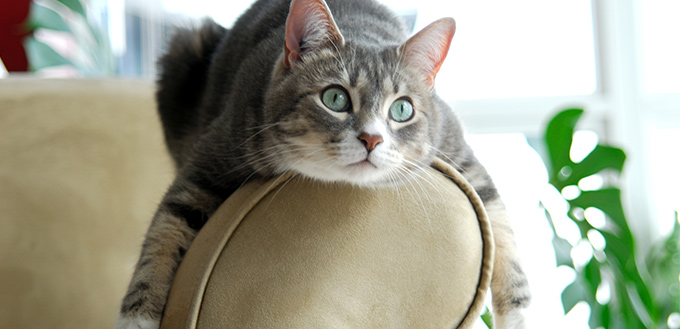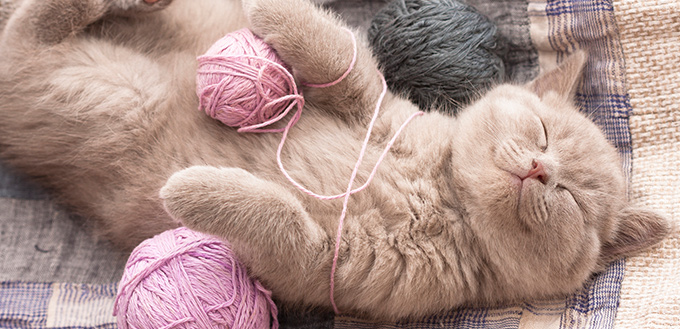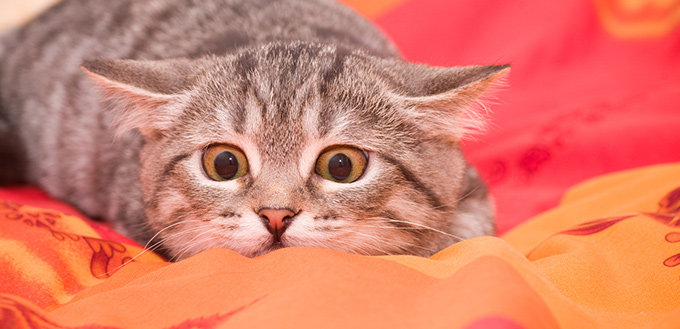Cats are mysterious animals. One second, they may be playful, and another, they apparently can’t stand the sight of you. They never seem to love you more than when you are busy doing something important and they disappear for hours throughout the day. No-one knows where they get to, but they are guaranteed to return to you when they get hungry. These mysterious creatures have many odd behaviour patterns that just baffles their humans, but there is one behaviour we can help you to understand – their tendency to knock your belongings off tables, sometimes destroying them.

Knocking Your Knick-Knacks
Just one of the many ways your beloved pets have managed to ruin your belongings, it is more than a little bit annoying when cats knock off fragile objects like kitchenware and vases. Even when things don’t break, it can make your house a mess and, unless you are willing to coat your home in a layer of cushions, it seems like you might just have to put up with living with cat-astrophe.
On a serious note, while it may mostly be an annoyance at the moment, sometimes this behaviour can be dangerous for your beloved pet. If they are home alone with broken glass, spilled liquids that they shouldn’t ingest, or, god forbid, anything flammable on a hot day, it could be quite dangerous, and your beloved cat may even get hurt, so trying to control this behaviour is quite important.
But, don’t worry, it is possible to own nice things and keep your favourite feline friend safe. In order to know what to do about your cat’s troubling habit of knocking things over, first of all you need to understand why they do it. There are three reasons why it may be happening, and they largely depend on the age and experiences of your cat:
- They are curious
- They are playing
- They want attention
Curiosity
There is a reason the phrase ‘curiosity killed the cat’ exists, and that is because cats are inherently curious creatures. From Ancient Egyptian idols to big predatory cats to your little tabby, cats are famous for cautiously investigating new experiences. This is also true of most of the objects around your house, particularly when they are just a kitten.
When you introduce a new feline into your home, they will investigate everything. Every room and every object will be under scrutiny, and the best way for a cat to investigate an object is to bat at it with their paws, which are the softest and most sensitive part of their body. This is particularly true if they think that the object may be prey. When batting at prey, they are testing to see if it will move so that they can strike and catch it.
Young cats are most likely to exhibit this behaviour as there are many things that they have not seen before. Who knows what could be a mouse? Your makeup brush, your tv remote control, your keys – all potentially dangerous prey to be dealt with.

Playing
Another behaviour that young cats are more likely to exhibit is simply playing with your stuff, although cats of any age also love to play. They may be playing with your pens while thinking they are prey, or they may just be playing because they want to play.
Making the object move and then pouncing is the best way to simulate hunting and is one of the most common ways that cats like to play. If you are lucky enough to be a cat owner, you will have seen them jumping around and stalking small odds and ends many times. This is often exactly what causes that loud crash in the next room – either they were stalking the object that fell to the floor, or it got in their way while they pursued something else.
Both these traits, curiosity and playfulness, are the most likely reasons for the first few times that your cats knock your belongings to the floor. After time, however, it is possible that another reason could explain this behaviour, and it is more due to your reaction, than their own traits.
Attention
Picture this – you are a cat and you are bored. You walk around the house poking a few things here and there, but you’ve long since learned that your human’s watch is not a mouse. Then, as you lazily walk by the windows…crash! You’ve knocked three plant pots to the floor. Your owner comes running, picks you up and, though their voice sounds stern, they hang out with you, pet you and generally show affection towards you.
What would you do the next time you are bored? Of course, you find something else to make a mess of, something loud that will catch their attention, like a vase or a plate. This is what happens with many cats who get into the habit of knocking items off tall surfaces. Rather than playing or investigating, they start to cause chaos when they want you to pay attention to them – just like a naughty toddler might.
Older cats who are regularly behaving this way usually have this motivation as they are older and wiser, with less curiosity and less playfulness. This conditioning can be the most damaging because they are actively seeking items that will make the most noise to grab your attention. But, don’t worry! If you want to be able to have fragile items in your home, there are some things you can do to recondition your cat’s behaviour.

What Can You Do About It?
It can be hard to tell exactly what the reason is behind your cat’s behaviour. They may be young and excitable, or they may just want attention. So here are some general tips that can work for a variety of causes that should help to train your cat out of knocking things over so that they stay safe, and your home stays clean and tidy:
- Remove temptation
Although the aim may be to train you cat not to knock over your things. An obvious short-term fix could be to be aware of where you place your belongings. Keep fragile items out of reach, and place small items inside larger items that may be too heavy to knock over. For example, putting plants inside a large planter, weighed down with rocks, will mean that your cat cannot knock over the plants. Maybe you could keep your keys and other everyday knick-knacks in a particular box by your front door which, although small, is also weighed down by something.
They say people can adopt new habits in 3 months, and, similarly, a cat who has gone a long time without deliberately knocking things over will soon get out of the habit. At the very least, it will allow you time to explore some of the other solutions outlined below.
- Don’t reward bad behaviour
If you suspect your cat is acting out of a desire for attention, or you are concerned they may develop this association, make sure you don’t come running when something falls to the ground. This may prove more difficult if you can hear that it is glass and you concerned that they may hurt themselves, but in this case, you should move them out of harms way and then leave them, rather than giving them attention. Maybe you can shut them in a particular room while you clean up the mess.
- Pay attention
While it is important not to bestow attention as an unintentional reward for poor behaviour, it is also important to consider why your cat is so desperate for your attention in the first place. Are they stuck at home all day for many hours? Have you been particularly busy at work lately? Watch your cat’s behaviour and listen to them. If their behaviour has changed recently, ask yourself ‘Why?’ and try and take it from there. Just make sure you do it in a way that reinforces good behaviour, rather than bad.
- Redirect the fun
If your cat or kitten is just being a bit clumsy while they play, consider buying them specific cat and kitten toys designed for their hunting instincts. Encourage them to play with them in certain, safe areas of the house. If you see them moving the toy to unsafe areas, move them and the toy to a safe area and repeat until they get the message.
There are plenty of cat toys which stimulate their desire to hunt that also involve you, so maybe you could combine the last tip with this one to create some great, quality time together. If you make sure to always play together in the same, safe area, they will learn that this is the location where they get the most attention.
Hopefully, one of these tips will help you to help your cat be the best behaved and safest cat they can be. But, it is worth noting that even behaviorists are still a little unsure if this behavior can be fully explained by curiosity, playfulness, and attention-seeking, so don’t be too hard on your cat if it doesn’t work. You may want to discuss it with your vet for further advice.
Sources:
- Caitlin Ultimo, Why Do Cats Knock Things Over?, PetMD
- Angie Bailey, Why Do Cats Knock Things Over?, Catster






